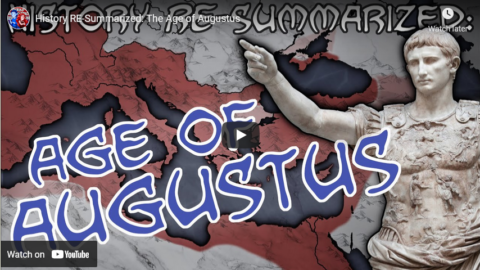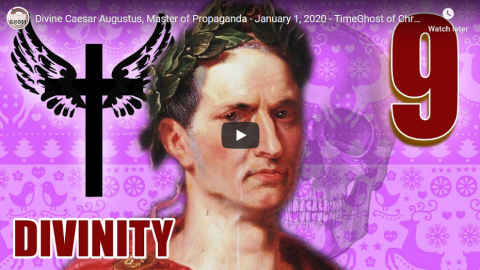Overly Sarcastic Productions
Published 19 Mar 2021Many Romans had conquered the Republic, but nobody could keep it, until Augustus. In the half century after the assassination of Caesar, his adoptive son would fundamentally transform the Roman state: expanding it, reforming it, and bringing it under the control of one man. The Age of Augustus found Rome a Republic and left it an Empire.
This video is a Remastered, Definitive Edition of three previous videos from this channel — History Summarized: “Augustus Versus The Assassins”, “Augustus Versus Antony”, and “How Augustus Made An Empire”. This video combines them all into one narrative, fully upgrading all of the visuals and audio. If you want more Histories to be Re-Summarized, please comment and let me know!
SOURCES & Further Reading: The Age of Augustus by Werner Eck, Augustus and the Creation of the Roman Empire by Ronald Mellor, Cleopatra: A Life by Stacy Schiff, Virgil’s Aeneid, Polybius’ Histories, Livy’s Ab Urbe Condita, Plutarch’s Parallel Lives, SPQR by Mary Beard, Rome: A History in Seven Sackings by Matt Kneale, (and also my degree in Classical Studies).
SECTION TIME-CODES:
0:00 1 — Octavian V. the Assassins
07:40 2 — Octavian V. Antony
17:36 3 — Augustus as EmperorOur content is intended for teenage audiences and up.
PATREON: https://www.Patreon.com/OSP
PODCAST: https://overlysarcasticpodcast.transi…
DISCORD: https://discord.gg/osp
MERCH LINKS: http://rdbl.co/osp
OUR WEBSITE: https://www.OverlySarcasticProductions.com
Find us on Twitter https://www.Twitter.com/OSPYouTube
Find us on Reddit https://www.Reddit.com/r/OSP/
March 20, 2021
History RE-Summarized: The Age of Augustus
May 17, 2020
Cicero’s Finest Hour (44 to 43 B.C.E.)
Historia Civilis
Published 16 May 2020Patreon | http://patreon.com/HistoriaCivilis
Donate | http://www.paypal.com/cgi-bin/webscr?…
Merch | teespring.com/stores/historiacivilis
Twitter | http://twitter.com/HistoriaCivilis
Website | http://historiacivilis.comSources:
Cicero, “Letters to Atticus” | https://amzn.to/3b8EQby
Cicero, “The Philippics” | https://amzn.to/35EHcOe
Suetonius, “The Life of Julius Caesar” | https://amzn.to/2xJesHH
Plutarch, “The Life of Julius Caesar” | https://amzn.to/35DG6lZ
Plutarch, “The Life of Cicero” | https://amzn.to/2Laca7w
Plutarch, “The Life of Brutus” | https://amzn.to/2SLaWUC
Nicolaus of Damascus, “The Life of Augustus” | https://amzn.to/3dlQeCg
Appian, “The Civil Wars: Book 3” | https://amzn.to/2WbJXU4
Cassius Dio, “Roman History: Book 44” | https://amzn.to/35HC4ce
Cassius Dio, “Roman History: Book 45” | https://amzn.to/35HC4ce
Cassius Dio, “Roman History: Book 46” | https://amzn.to/2WDNIka
—
Barry Strauss, “The Death of Caesar: The Story of History’s Most Famous Assassination” | https://amzn.to/2WAUxTD
Tom Holland, “Dynasty: The Rise and Fall of the House of Caesar” | https://amzn.to/2zjG4n4
Adrian Goldsworthy, “Antony and Cleopatra” | https://amzn.to/2L8MQ1F
Anthony Everitt, “Cicero: The Life and Times of Rome’s Greatest Politician” | https://amzn.to/3bbrKKM
Tom Holland, “Rubicon” | https://amzn.to/3dombKn
Adrian Goldsworthy, “Augustus” | https://amzn.to/3fAInmD
Anthony Everitt, “Augustus: The Life of Rome’s First Emperor” | https://amzn.to/2Wf9CLH
Adrian Goldsworthy, “Caesar: Life of a Colossus” | https://amzn.to/3cfFQvUMusic:
“Moving Forward,” by Adi Goldstein
“Blonde,” by Nctrnm
“Heliograph,” by Chris Zabriskie
“The House Glows (With Almost No Help),” by Chris Zabriskie
“Hallon,” by Christian BjoerklundWe are a participant in the Amazon Services LLC Associates Program, an affiliate advertising program designed to provide a means for us to earn fees by linking to Amazon.com and affiliated sites.
January 2, 2020
Divine Caesar Augustus, Master of Propaganda – January 1, 2020 – TimeGhost of Christmas Past Day 9
TimeGhost History
143K subscribers
Dissent This
Julius Caesar was already associated with the Divine during his life. But two years after his death, he was officially declared so by the Senate of Rome. Very much to benefit of his cousin, Octavian.Join us on Patreon: https://www.patreon.com/TimeGhostHistory
Hosted by: Indy Neidell
Written by: Joram Appel
Directed and Produced by: Spartacus Olsson and Astrid Deinhard
Executive Producers: Bodo Rittenauer, Astrid Deinhard, Indy Neidell, Spartacus Olsson
Creative Producer: Joram Appel
Post-Production Director: Wieke Kapteijns
Research by: Joram Appel
Edited by: Karolina Dołęga
Sound design: Marek KamińskiSources:
Wellcome Library no. 42647i
Calendar by Lorena Salagre from the Noun ProjectMusic from Epidemic Sound Library:
“A Sleigh Ride Into Town” – Howard Harper-Barnes
“Ancient Saga” – Max Anson
“Thunder Storm 01” – Fredrik EkstromA TimeGhost chronological documentary produced by OnLion Entertainment GmbH.
From the comments:
TimeGhost History
1 week ago
Happy New Year! We have some amazing videos coming up in the new year, but not before we publish the final instalment of our TimeGhost of Christmas Past episode. This one is my personal favourite, as I’m a huge fan of the late Roman Republic and early Empire as a historical study object. So when we were dividing the Christmas episodes among the research team, I fought for this one to be on the list. I had a blast writing it (surprisingly, I don’t get to write about Caesar that often for the WW2 Channel) and I hope you all enjoy watching it.
Cheers,
Joram
December 11, 2014
QotD: Favourite expressions of the Emperor Augustus
“What about Apollo?” interrupted Vinicianus. “I never heard that Apollo was married. That seems to me a very lame argument.” The Consul called Vinicianus to order. It was clear that the word “lame” was intended offensively. But I was accustomed to insults and answered quietly: “I have always understood that the god Apollo remains a bachelor either because he is unable to choose between the Nine Muses, or because he cannot afford to offend eight of them by choosing the other as his bride. And he is immortally young, and so are they, and it is quite safe for him to postpone his choice indefinitely; for they are all in love with him, as the poet What’s-his-name says. But perhaps Augustus will naturally persuade him to do his duty by Olympus, by taking one of the Nine in honourable wedlock, and raising a large family — ‘as quick as boiled asparagus’.”
Vinicianus was silenced in the burst of laughter that followed, ‘quick as boiled asparagus’ was one of Augustus’s favourite expressions. He had several others: ‘As easily as a dog squats’ and ‘There are more ways than one of killing a cat’ and ‘You mind your own business, I’ll mind mine’ and ‘I’ll see that it gets done on the Greek Kalends’ (which, of course, means never) and ‘The knee is nearer than the shin’ (which means that one’s first concern is with matters that affect one personally). And if anyone tried to contradict him on a point of literary scholarship, he used to say: ‘A radish may know no Greek, but I do’. And whenever he was encouraging anyone to bear an unpleasant condition patiently he always used to say: ‘Let us content ourselves with this Cato’. From what I have told you about Cato, that virtuous man, you will easily understand what he meant. I now found myself often using these phrases of Augustus’s: I suppose that this was because I had consented to adopt his name and position. The handiest was the one he used when he was making a speech and had lost his way in a sentence — a thing that constantly happens to me, because I am inclined, when I make an extempore speech, and in historical writing too when I am not watching myself, to get involved in long, ambitious sentences — and now I am doing it again, you notice. However, the point is that Augustus, whenever he got into a tangle, used to cut the Gordian knot, like Alexander, saying ‘Words fail me, my Lords. Nothing that I might utter could possibly match the depth of my feelings in this matter.”
Robert Graves, Claudius the God, 1935.






